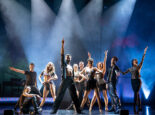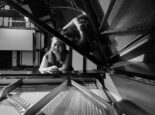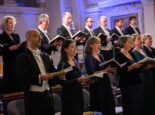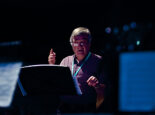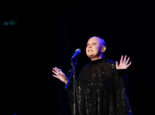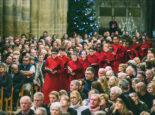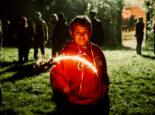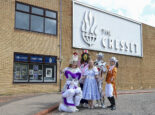Fringe Benefits
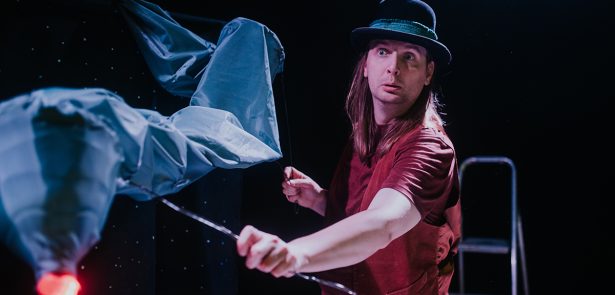
This year, Peterborough company Lamphouse Theatre took their brand-new comedy, musical, sci-fi epic (well, sort of...) to the biggest arts festival in the world: Edinburgh Fringe. War of the Worlds (on a budget) turned out to be a huge hit, with packed houses and rave, four and five star reviews from all the publications that matter, including The Stage, who summed it up as: ‘Fearless fun. Utterly and endearingly bonkers’. A week from the end of its run, The Moment talked to creators and performers Tom Fox and Becky Owen-Fisher about Martians, making a show and dealing with the whole Edinburgh experience...
So, how’s it all going? I know you’re still right in the thick of it…
Tom: Yes, we’re just getting to the last performances, so we’ve kind of found a second wind. We had a bit of an energy drop at the end of last week and it just felt like we’d been doing this forever – but the light is at the end of the tunnel!
How many performances will it have been by the end?
Tom: In Edinburgh we will have done 22, but it will have been about 35 overall.
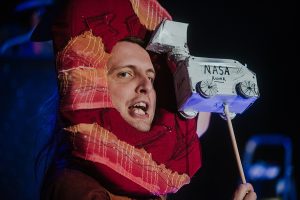 How did the show come about?
How did the show come about?
Becky: The initial idea came about back in 2020. When we first went into lockdown, we were in the middle of a run of something else, and had to just shut everything down. And the first thing we did was go ‘Well, let’s see what we can do online…’ The first thing that we live streamed as part of a 10 week programme that we put together – which we called Live From Our Living Room – was War of the Worlds (on a budget).
Tom: Our tagline for Lamphouse Theatre is ‘Epic stories – intimate settings’. And our living room is about the most intimate setting you can get! So we were thinking ‘OK, what’s the most epic story that we can think of? Something that would be so impossible to do in our living room?’ And Becky suggested War of the Worlds, because we happened to have it on the shelf.
Becky: That version was very much in its infancy – just a Zoom version – but we never really let go of the idea. Then we decided at the end of last year that we wanted to go to the Fringe. We hadn’t been for six years, so it was time to go back, but we knew we needed to take something that had a really catchy title. And we’d really loved playing with it the first time around, so it was ‘Yeah, War of the Worlds (on a budget)… Let’s do it!’ And then in January of this year we started thinking about the structure and what it might look like. We knew it was going to have to be a one person show, just because of the logistics up here at the Fringe.
Tom: Plus we’re on a budget!
Becky: When we’re talking about a one person show, though, that’s not Tom just sitting in a chair and narrating it. Tom plays everything. So he plays the planet Mars, he is the storm, he is the Martian tripod, he is the heat ray… And we’ve got all of these very silly costumes. I do add a little bit of narration on my microphone just to help move stuff along.
What’s the process behind a show like this? How and where do you start?
Becky: We’re a devising company, so we don’t tend to make shows with a script going into rehearsals, we write the scripts as we make the work. So it was very similar in that respect, coming in and knowing that it had come from a performance already, and then going through and reworking what we needed and writing new stuff.
Tom: The joke is that we give our actors the script after the first performance…
Becky: It’s actually one of the shows that’s taken us the longest to make. Usually we make our shows very quickly, have three to five weeks of rehearsals and then we go on the road. But this one took us about six months to develop in various stages. It started with just us in a room, and then a couple of other people came in, and we got our composer on board, then we got our musical director, our puppet builder, our clown consultant and by the end there were lots of people in the room!
Tom: You could come to see the show and think ‘Ah! Becky and Tom have made this!’ But there is actually this huge team behind scenes that has guided us.
I know you also did some previews in London. Was it developed through performance?
Tom: There’s lots of clowning in this – physical comedy, or whatever you want to call it – and without an audience, that’s so difficult, because during rehearsal’s everyone’s looking at it critically, so no one’s laughing. I’m being really silly and sort of thinking ‘This isn’t landing…’ So, we needed the audience. And we did that preview week in London, and it was so helpful to get an audience reaction and see what was working and what wasn’t.
Becky: We actually rewrote whole sections of the show after the previews – and on the train on the way up to Edinburgh we were still editing parts of the show! Then you have a debrief after every show, asking ‘Does everything work? Is everything landing? Do we need to change stuff?’ So, it’s always in motion. It’s never set in stone.
Tom: And the audience is so, so important. With all of our work, we always say that we rehearse 70% of it, and then we leave that 30% for it to be different every night and for the audience to get involved. That makes it good for us, because every show is different depending on who’s in the audience that day – what they’re interested in, what they shout out and what they want to happen!
It sounds rather like panto…
Becky: A lot like panto, yes! We do a lot of family shows around Christmas time, and although we’re billing this as 12+ – because the red weed is a bit sexy – it’s really a big kid show for grownups. There’s lots of fun and lots of comedy in it!
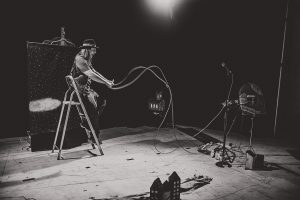 What’s so significant about this show, of course, is that it is based on something that already exists, and which has made a huge cultural impact across all kinds of media. How did you approach that source material?
What’s so significant about this show, of course, is that it is based on something that already exists, and which has made a huge cultural impact across all kinds of media. How did you approach that source material?
Becky: We were very aware that there are three very specific fan bases for War of the Worlds. There’s the H.G. Wells fanbase, the Jeff Wayne fanbase – a lot of people love the arena tour and the album – and then the sort of Tom Cruise generation of War of the Worlds fans, from the film in the early noughties. Plus a bit of Orson Welles! But we knew we wanted to pay homage to those three key elements. So, our composer Rebecca Applin, who is incredible, was keen to make sure that there was a real feeling of Jeff Wayne in the music. So it’s very 70s, very synthy. She’s tied it all together so cleverly throughout the whole piece. That’s kind of our little ‘thank you’ to Jeff Wayne.
Tom: And it actually is very close to the novel.
Becky: We’ve cut a few bits, but it’s mostly all there. But there’s this ongoing issue with the fact that there’s just no significant female presence in the book. And, obviously, we have a male actor. As time was going on in the rehearsal room, I was getting more and more frustrated about the fact there were no women in it… I thought, we can’t do a show in 2022 with no women in it! So there’s a byline that runs all the way through the play, which is me as a technician – and I am genuinely teching the show out the back – commenting on the massive lack of feminine presence. And then I end up on the stage at the end, playing the female character that we’ve written into it. So, we’re kind of making a social commentary at the same time.
Tom: There’s great comedy value in me, as a man, being really awful at playing this female character. The audience is in on the game, then I try even harder and it just gets worse!
Becky: We’re trying to keep as close as we could to the novel while also putting a 21st century spin on it, so we’re not just doing a carbon copy. It’s also not set in any specific time period. We talk about the 1800s, but then we make reference to lots of other things as well. And there’s a huge ballad at the end which tells humans off for being rubbish and destroying their planet. So it’s got a bit of modern messaging. In the book, we don’t really know why the Martians come. They just turn up. We’ve given a bit of a reason. And we just decided we wanted them to tell humans off at the end. So the Martians are coming to earth to try and eradicate humanity because humans are trying to take over space, with Elon Musk wanting to colonise Mars. The Martians are saying: ‘You’ve wrecked your planet, you’re not going to wreck ours too!’
The novel is pretty grim – not a lot of laughs! Does that make it harder to approach as comedy?
Tom: It kind of makes it easier! We do some comedy Shakespeare shows, and we always find that the tragedies are funnier. I’m trained as a theatrical clown, and the difference between a comedian and a clown, for me, is that a comedian comes on stage with a good idea and some really
good material, and they know it’s going to really hit, whereas a clown comes on stage with really bad material and tries to make it work anyway. And that’s why the audience find it endearing. Doing War of the Worlds on a budget is basically a really bad idea, but he’s trying so hard to make this work. He tries to be serious and tries to play a Martian tripod, but because it’s made out of cardboard the audience can’t help but laugh. And then there’s that genuinely serious moment right at the very end where we ask ‘Have we learned anything?’
Becky: We really wanted to make sure that even though we’re being very silly, there’s still a point to be made, about what humans have learned and what we are doing to our own planet.
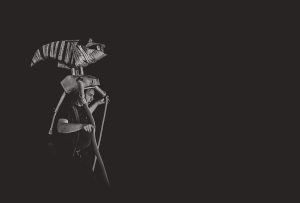 Given the summer we’ve had, with drought and wildfires, it seems like this really hit a nerve…
Given the summer we’ve had, with drought and wildfires, it seems like this really hit a nerve…
Becky: I think it’s really good timing for it. Even though War of the Worlds is about aliens, it still makes you think about the bigger picture. And I think it was really important to have that serious moment at the end. That seems to be one of the things that people have liked; we’ve had several reviews that have said that it’s daft and it’s silly, and it’s a good escape, but it’s underpinned with something meaningful. That’s kind of what completes it.
You mentioned the Jeff Wayne musical version of the story and wanting to also please those fans. How did you tackle that?
Tom: Our composer Becky Applin was really, really clever. She did a lot of research and created a sound that feels like it’s been inspired by Jeff Wayne, without being ‘like’ it. People are saying that the soundtrack even sounds like it was recorded in the 70s!
Becky: Also, because it’s ‘on a budget’, she deliberately made all of the music ‘on a budget’, with a synthesizer, with a piano.We didn’t get a band in. So it was all done on a single keyboard, essentially.
Tom: We’ve actually had loads of people come to the show with Jeff Wayne t-shirts, and many of them are actually younger than us, which is a demographic we didn’t think about! But we didn’t want anyone to be disappointed about the content, so we’ve made specific nods to things people would know from the album.
Becky: Like the Thunder Child sequence… That’s in the book, but it feels like it’s a bigger deal in the Jeff Wayne album, so we were very aware that the Jeff Wayne fans would want that. But then, obviously, ours goes off in some different directions, and we’ve got songs of different genres all the way through.
Edinburgh is the biggest arts festival in the world. What has the experience been like?
Tom: It’s really overwhelming. There are 3,500 shows here, and you can just feel it with the amount of posters and people around. We’ve done shows up here before – 2016 was the last time we did it – but we were really naïve then. We knew nothing!
Becky: In 2016 it was an unknown show, a brand-new piece of writing, and we just sort of went trying stuff out. We didn’t really know what it was going to be like. We learned an awful lot from that.
Tom: You get reviews in and some of them are good and some are bad. But we were really unlucky last time, because our very first review was quite bad. And you’ve got four weeks left! So, you’ve got to get on with it. But we did a lot of prep this time. We knew we needed to be seen.
Becky: There was a lot of lead up to it, and an awful lot of emailing – all the press, but also all of the industry people that might want to come and see the shows, the big theatres from around the country that are here, scouting. And then also a lot of people that we wanted to meet that we might want to work with in the future. So we were much more prepared from that perspective. We did a lot of mental prep as well. We had a lot of honest conversations, accepting that people might not like it, and that we might get bad reviews, and that we should be ready for that. I think last time we were very sensitive about it, and it was really hard getting reviewed badly, whereas this time, I think we’re a bit older and a bit wiser.
Tom: Also, testing the show out before coming really helped. We had several reviewers in our very first performance, and we got really good reviews. And I think that’s why we’re selling well – because of those very initial reviews. The word does spread, so we were lucky to be able to hit the ground running. But every day is a new challenge. The other day, just moments before the performance, we were told that Stewart Lee was in. And then one day The Scotsman was in, and The Stage. So it’s a lot of pressure. I wouldn’t necessarily recommend it!
Becky: Also, because of the nature of the venue, we only have five minutes before the show to set up, and five minutes to break down again at the end. It’s not a lot of set, but there’s quite a bit of tech involved in the show, so there’s a lot of pressure in that five minutes to get everything set up properly and you never quite know whether it’s going to work until you press the first button.
Five minutes..? That’s not a lot!
Becky: We rehearsed doing it in five minutes. It was possible. But it does mean that every day is all adrenaline. And then, after you’ve done the show, we have to go out and flyer, or we have to meet people or we have to, you know, try and persuade people to come and see the show or do a lot of emailing. So it’s a bit like Groundhog Day. We’re quite lucky, because we’re a morning slot, which is nice – we get the show out of the way quite early on in the day. I think if we had to wait all day, I’d be nervous by the end of it. And this time around we have been dealing with Edinburgh by coming home and having lots of afternoon naps! There are so many 20-year-olds running around like crazy, flyering in all their costumes and standing on bollards, singing songs in the street, and I’m like ‘Oooh, I’m going for a nap…’ Totally different experience!
Tom: But it is amazing. It’s the biggest trade show that the arts has got. The connections that we’ve had, and the people that we’ve talked to, we couldn’t get anywhere else. If you’re thinking of coming to perform, I think you’ve got to have a real purpose. You’ve got to know why you’re coming. Because a lot of people come up like we did that first time and go ‘Oh, we’ll just do Edinburgh!’ And they lose thousands of pounds, get really drunk, perhaps have a good time – but what else do they actually get out of it? Because we planned and came with a purpose, we got so much more out of it.
What have the audiences been like?
Becky: Amazing. We’ve been so lucky. I mean, I think that’s partly because of our time slot. We’ve been on mid-morning, and there’s not a lot else on at that time of the morning, and so we’ve been catching that early audience. And we got a four star review from The Stage on the second day, which is just like the Holy Grail. We drank a lot of prosecco that night!
Tom: And it grew. For our very first performance we had about eight people. And then reviews came out and then it went to 20, and then 30. And now we’re sold out.
Becky: …which we couldn’t even have dreamt. I mean, obviously you come up hoping that you’re going to get the stars, the reviews, the audiences but you never actually know. And I’m still not sure if this is really happening!
What is a typical day for you? Is there such a thing..?
Becky: We have breakfast, we get the bus, we do the show. And then we come back!
Tom: …and we have a nap! That’s mainly because we’re teching another person’s show at 10.30 at night.
Becky: So we’re kind of on these 12 hour cycles. We also try and catch a couple of other shows in the evening so we can see as much as possible before we tech our friend’s show, and then we get home about half midnight. Then we get up and do it all again! But people do go and support each other’s shows – definitely within the clowning and comedy improv community. A lot of the people that Tom trained with in France have been coming to see our show, so there’s this lovely little community of people that will go and support each other – kind of an international network of comedy, theatre people, clowns…
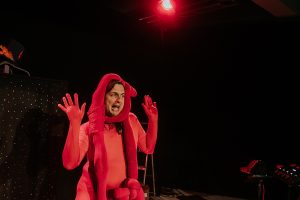 This is also putting Peterborough on the map, of course – not by just sitting and waiting for someone to come to you, but by taking it out there, extending those networks…
This is also putting Peterborough on the map, of course – not by just sitting and waiting for someone to come to you, but by taking it out there, extending those networks…
Becky: It’s lovely to think that is the case. We’ve been working in Peterborough for about 10 years now. We’ve always done shows in and around Peterborough, and we still tour locally when we do our Christmas tours and things. I want to tour to some of the bigger theatres around the country and this is the opportunity for us to get our work out there, but we’ll always be based in Peterborough. We have a very lovely, very loyal audience base.
Tom: And so much support has been coming our way from our audience in Peterborough, who are following us on social media. Some have even booked tickets up to Edinburgh, and it’s been incredible to see familiar faces in the audience!
Will you be bringing this show back to Peterborough?
Becky: Possibly next year. We are taking it to The Commemoration Hall in Huntingdon on 14th October this year. Then, next year we’re hoping for a big tour, so we could bring it back to Peterborough in 2023!
Tom: As soon as we get back we’re running Switch Festival; through that we’re supporting five early career artists, with connections to Peterborough, to make their very first piece of professional work, and these shows will be performed at the Key Theatre on 2nd October. The Switch project started at the same time as War of the Worlds (on a budget) and the five artists came into rehearsals. Then the creative team has been mentoring them to make their new work. It’s been incredible for us, because it’s similar to how we started.
Becky: It’s like paying it forward. We were able to start Lamphouse because we were given support and help. Eastern Angles and Metal came into the city and gave us space, and time, and a little bit of funding to start creating. And now we’re 10 years down the line, we want to support the next generation, so this is an opportunity for us to help these artists to make their first new professional piece.
After all that, what’s next for you?
Tom: Our Christmas tour is Alice in Winterland – a comedy version of Alice, with two people playing
all the parts and live music. We want to make that quite rock’n’roll. And a lot of people are asking us, if we do Edinburgh again, what’s our next ‘…on a budget’? The answer to that is, we don’t know yet! But there’s definitely something ‘…on a budget’ that we want to do, and we’re looking for suggestions…
Becky: War of the Worlds will continue to have a life as well. Hopefully, if we get accepted, we’ll take it to a big festival in London, and then after that, a national tour would be the goal. But we’ll see what happens!
www.lamphousetheatre.co.uk
Twitter: @LamphouseTheatr
PHOTOS: THOMAS BYRON PHOTOGRAPHY








